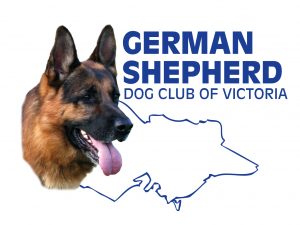Pets as Therapy Program
German Shepherd Dogs and their Involvement in the Guide Dogs Victoria Visiting Pets as Therapy Program
June Pound
(previous Secretary of the Northern Branch GSDCV and volunteer member of the Guide Dogs Victoria Visiting Pets as Therapy Program)
The GSDCV acknowledges with thanks the approval of Guide Dogs Victoria to publish this article
Our handsome German Shepherds are not just pretty faces. They are working dogs that have earned a well deserved reputation in the community as Police, Army, Navy and Airforce dogs, Guide Dogs, and Search and Rescue dogs. Perhaps not as well known is that they are excellent therapy dogs visiting patients in hospitals and nursing homes.
The Northern Branch of the German Shepherd Club of Victoria (GSDCV) first became involved in the Visiting Pets as Therapy Program (VisPAT) run by Guide Dogs Victoria through one of their instructors, the late Joan Storey, who at that time was also involved with the Warringal Dog Club. Through her contact with the Warringal Dog Club, she got to know Michael Tucker (ex-trainer of Guide Dogs) and Joan Ray who had themselves become involved in VisPAT.
Guide Dogs Victoria initially started VisPAT by re-training as therapy dogs those dogs that had failed to make the high grade required to lead people who are blind or vision impaired. A significant part of this retraining involved visiting a wide variety of centres to get the dogs used to all sorts of situations and people. As the popularity of the Program grew, so there were an ever-increasing number of requests from hospitals and nursing homes for dogs to visit, drawn from a pool of carefully selected volunteer dog owners.
Michael Tucker and Joan Ray started the group of volunteers and, as the requests for doggy visitors grew, so did the number of dogs required to fill the rosters. When, for various reasons, the source of dogs from Warringal Dog Club dried up, Joan Storey asked the members of Northern Branch of the GSDCV to volunteer. Eastern and Malvern Branches of the GSDCV soon followed.
Today, Michael Tucker carefully vets volunteers and their dogs. The dogs must be friendly, stable in temperament, and well behaved. Michael takes special note of all the dogs’ behaviour through doing “unexpected” things such as approaching the dog without warning to pat them, and assessing how they react when meeting another dog on the street or mixing with crowds of shoppers and their shopping trolleys. Dogs have to be unfazed by travelling in a lift and by greeting people confined either to wheelchairs or with various different medical attachments who might respond in a manner that the dog is not accustomed to.
The current Visiting Pets in Therapy Program roster mean that volunteers visit a hospital or nursing home once every six weeks and prior to visiting the dogs must be bathed, wormed, and have their nails clipped so as to avoid scratching fragile skin.
At the nursing homes, volunteers get to know the dog lovers who greet the dogs enthusiastically, however sometimes there are people who are unable to respond.
I remember one day, in particular, when I arrived at a nursing home and the nursing sister grasped my arm and said. “Quick, come with me! You’re just what we need. ‘O’ is in a bad mood and your dog Ben will cheer her up.” ‘O’ was lying on her bed all curled up with her back to us as we walked into her room. Once she had been in the women’s forces during the World War II and had previously owned a German Shepherd of her own. There were photos on the wall to prove it! Now she could no longer get out of bed or speak, and at present neither did she want to. Ben knew her from previous visits and immediately stood on his hind legs to search for her face hidden in the blankets. I could see the blankets shaking and I thought ‘O’ was crying. “I think we’ve upset her,” I said to the nursing sister. “No,” she replied, smiling. “She’s not crying, she’s laughing!” Sure enough, she was, and it brightened the day for us all.
I personally feel a strong feeling of pride in my two dogs that visit hospitals and nursing homes regularly. Ben in particular is so business-like when he gets in the lift, turning to face the doors and sitting patiently. The dogs seem to sense when they are needed and do what is required of them, which is good for them and rewarding for me. I think the dogs like to feel useful.
**Pets as Therapy via Dogs Victoria – Members wishing to be involved with Pets as Therapy could also contact Nicky Abel (at Dogs Victoria) on (03) 9822 0887 to register their interest. Note that there is now a requirement to have a police check done by the handler.

